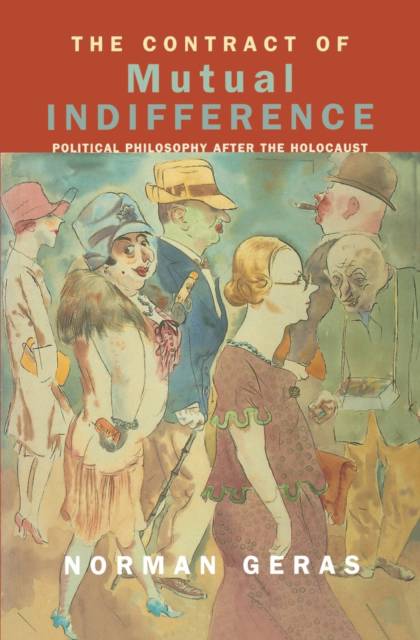
- Retrait gratuit dans votre magasin Club
- 7.000.000 titres dans notre catalogue
- Payer en toute sécurité
- Toujours un magasin près de chez vous
- Retrait gratuit dans votre magasin Club
- 7.000.0000 titres dans notre catalogue
- Payer en toute sécurité
- Toujours un magasin près de chez vous
The Contract of Mutual Indifference
Political Philosophy after the Holocaust
Norman Geras
Livre broché | Anglais
36,95 €
+ 73 points
Description
A powerful work of moral and political philosophy.The idea which I shall present here came to me more or less out of the blue. I was on a train some five years ago, on my way to spend a day at Headingley and I was reading a book about the death camp at Sobibor... The particular, not very appropriate, conjunction involved for me in this train journey... had the effect of fixing my thoughts on one of the more dreadful features of human coexistence, when in the shape of a simple five-word phrase the idea occurred to me. In The Contract of Mutual Indifference, Norman Geras discusses a central aspect of the experience of the Holocaust with a view to exploring its most important contemporary implications. In a bold and powerful synthesis of memorial, literary record, historical reflection and political theory, he focuses on the figure of the bystander--the bystander to the destruction of the Jews of Europe and the bystander to more recent atrocities--to consider the moral consequences of looking on without active response at persecution and great suffering. Geras argues that the tragedy of European Jewry, so widely pondered by historians, social scientists, psychologists, theologians and others, has not yet found its proper reflection within political philosophy. Attempting to fill the gap, he adapts an old idea from within that tradition of enquiry, the idea of the social contract, to the task of thinking about the triangular relation between perpetrators, victims and bystanders, and draws a somber conclusion from it. Geras goes on to ask how far this conclusion may be offset by the hypothesis of a universal duty to bring aid. The Contract of Mutual Indifference is an original and challenging work, aimed at the complacent abstraction of much contemporary theory. It is supplemented by three shorter essays on the implications of the Jewish catastrophe for conceptions of human nature and progress and for certain types of Marxist explanation.
Spécifications
Parties prenantes
- Auteur(s) :
- Editeur:
Contenu
- Nombre de pages :
- 192
- Langue:
- Anglais
Caractéristiques
- EAN:
- 9781859842294
- Date de parution :
- 17-08-99
- Format:
- Livre broché
- Format numérique:
- Trade paperback (VS)
- Dimensions :
- 134 mm x 190 mm
- Poids :
- 244 g

Les avis
Nous publions uniquement les avis qui respectent les conditions requises. Consultez nos conditions pour les avis.






